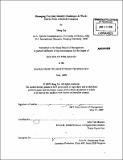Managing everyday identity challenges at work : stories from a biotech company
Author(s)
Xu, Heng, Ph. D. Massachusetts Institute of Technology
DownloadFull printable version (11.38Mb)
Other Contributors
Sloan School of Management.
Advisor
John Van Maanen.
Terms of use
Metadata
Show full item recordAbstract
Work identity, how we view ourselves in a working capacity, is a central part of who we are and an indispensable element of our lives. Yet, difficult moments frequently occur that challenge our identity as competent and worthy workers. The ongoing construction of work identity is the focus of this thesis. By studying three employee groups in a biotech corporation (scientists, purchasers, and contractors), I explore the question of how people manage identity challenges at work. I observe three primary approaches: interpretive, relational, and presentational. I find that scientists face the charge of being lesser scientists concerning their move from academia into industry. To manage this challenge, the scientists primarily use an interpretive approach, developing frameworks that value practical research and stress the intellectual content of industry work. Their approach forms a boundary inversion strategy, altering the normative order of the social boundary between academic and industrial science. The purchasers experience a different type of challenge when they strive to be experts but their clients see them as clerks. With a relational approach, purchasers seek to change practices in joint projects and ultimately to reshape their interaction with clients in a manner more consistent with their aspired expert identity. This approach forms a boundary expansion strategy to shift the task boundary between purchasers and their clients. The third group, contractors, encounters a liminal state of being neither an insider nor an outsider of the company. (cont.) They rely heavily on a presentational approach to project themselves like regular employees with a strong work ethic. This approach forms a boundary crossing strategy as individual contractors seek to become permanent employees. Comparisons across the three groups show that several boundary characteristics - the level of institutionalization, the permeability for social actors, and the relative status difference - are important to shape the micro responses and macro strategies that people adopt to manage their identity challenges, and ultimately remake the social boundaries that give rise to these challenges.
Description
Thesis (Ph. D.)--Massachusetts Institute of Technology, Sloan School of Management, 2009. Cataloged from PDF version of thesis. Includes bibliographical references (p. 183-196).
Date issued
2009Department
Sloan School of ManagementPublisher
Massachusetts Institute of Technology
Keywords
Sloan School of Management.